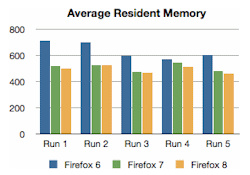 Upcoming browser will use as much as 50 percent less memory.
Upcoming browser will use as much as 50 percent less memory.
Mozilla is tackling the amount of memory that its Firefox web browser uses, and how it uses it over prolonged periods of times. For users who keep a lot of tabs open for long periods of times, memory usage might become an issue on some systems.
On Mozilla's blog, programmer Nicholas Nethercote details improvements that are being made to near-future releases of the browser. Mozilla recently switched to a quick release cycle, promising major updates much more quickly than in the past, mimicking Google's release patterns for the Chrome browser.
"Firefox 7 uses less memory than Firefox 6 (and 5 and 4): often 20% to 30% less, and sometimes as much as 50% less," Nethercote wrote. "In particular, Firefox 7′s memory usage will stay steady if you leave it running overnight, and it will free up more memory when you close many tabs."
He credited the improvements to MemShrink, which is a Mozilla effort to improve how Firefox uses memory. Going past Firefox, he said early development versions of Firefox 8 even improve memory usage further.
On Mozilla's blog, programmer Nicholas Nethercote details improvements that are being made to near-future releases of the browser. Mozilla recently switched to a quick release cycle, promising major updates much more quickly than in the past, mimicking Google's release patterns for the Chrome browser.
"Firefox 7 uses less memory than Firefox 6 (and 5 and 4): often 20% to 30% less, and sometimes as much as 50% less," Nethercote wrote. "In particular, Firefox 7′s memory usage will stay steady if you leave it running overnight, and it will free up more memory when you close many tabs."
He credited the improvements to MemShrink, which is a Mozilla effort to improve how Firefox uses memory. Going past Firefox, he said early development versions of Firefox 8 even improve memory usage further.
Tags:
Mobile Firefox













